|
|
|
Sort Order |
|
|
|
Items / Page
|
|
|
|
|
|
|
| Srl | Item |
| 1 |
ID:
175090
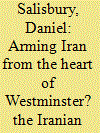

|
|
|
|
|
| Summary/Abstract |
During the Iran-Iraq war there were extensive rumours in the press regarding Iran’s use of Iranian Military Procurement Offices (IMPOs) in London to purchase arms. This article seeks to interrogate the facts behind these rumours: what was going on inside the IMPOs? How much intelligence did the British government have about this? Not a huge amount – largely a result of the IMPOs being a challenging target and Britain’s intelligence priorities in London lying elsewhere. More broadly the paper seeks to provide insights into the challenges of gathering intelligence from – and responding to the activities of – foreign government targets on home turf, as well as providing insights into an under-considered area of intelligence – that surrounding embargoes and sanctions.
|
|
|
|
|
|
|
|
|
|
|
|
|
|
|
|
| 2 |
ID:
100370
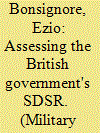

|
|
|
| 3 |
ID:
105399


|
|
|
|
|
| Publication |
2011.
|
| Summary/Abstract |
This is an extended version of Philip Murphy's inaugural lecture as director of the Institute of Commonwealth Studies, delivered on 23 February 2011. It traces the relationship of the UK with the wider Commonwealth over 40 years, paying particular attention to the rhetoric of governments and opposition parties from Wilson and Heath to Cameron. It examines the reasons for the Commonwealth being relegated to a peripheral role in British foreign policy, especially European preoccupations and the issues of Rhodesia and South Africa. It argues that the Commonwealth remains of considerable practical and enormous symbolic importance to the UK. The British government should engage with the Commonwealth more than it has done in the recent past and the Commonwealth should be both open to and critical of its imperial past.
|
|
|
|
|
|
|
|
|
|
|
|
|
|
|
|
| 4 |
ID:
130590
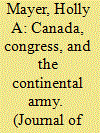

|
|
|
|
|
| Publication |
2014.
|
| Summary/Abstract |
Between 1774 and 1776 American rebels feared the British government would use French Catholic Canadians to contain their insurrection. As the empire advanced incorporation of its new subjects through the Quebec Act, the Continental Congress invited them to join its fellowship and invaded Canada to secure its cause. The invitations required that the rebels broaden definitions of civil, specifically religious, liberties, whereas enlistment of some Canadians challenged the Continental Army to practice what Congress proclaimed. Recruiting Catholic Francophone "others" by Protestant Anglophones as a strategy of war and nation building tested ideologies within the military sphere; the results reveal a precarious fit between developing public policy, military exigencies, and older biases
|
|
|
|
|
|
|
|
|
|
|
|
|
|
|
|
| 5 |
ID:
116622
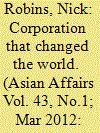

|
|
|
|
|
| Publication |
2012.
|
| Summary/Abstract |
For over 200 years the East India Company was the world's largest corporation. Set up as a merchant trading house in 1600, it became a permanent joint stock company in 1657, the forerunner of the modern multinational. The tension between investment and speculation was reflected in a share price which rose and fell with its fortunes. In the beginning bullion was brought from Britain to pay for Indian goods, which were then shipped to Britain. But in 1766, not long after Clive's victory at the battle of Plassey, the Company acquired the diwani, the right to collect the taxes, in Bengal. A situation of "unrequited trade" was thus established. Suddenly the profits from tax collecting more than covered the cost of trade goods. The dividend, jumped from six per cent in 1766 to 12 per cent in 1769. The shares soared. Then the Company's position in South India was threatened and the share price collapsed. The Company had overwhelming debts, but was judged "too big to fail". It had to be bailed out by the British government, which in return secured the right to nominate representatives to the Bengal Council. Corruption and accountability became increasingly important themes. By the time Warren Hastings was Governor-General the company was purchasing vast quantities of tea from China. What could be sold to China in return? Answer: Indian opium. This trade notoriously led to war with China. But by the end of the Second Opium War, the Indian Mutiny had put paid to the Company's rule over India, though the Company continued a financial existence until 1874.
|
|
|
|
|
|
|
|
|
|
|
|
|
|
|
|
| 6 |
ID:
086942
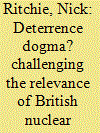

|
|
|
|
|
| Publication |
2009.
|
| Summary/Abstract |
In December 2006 the British government released a White Paper announcing its intention to begin the process of replacing its current Trident nuclear weapons system, thereby allowing it to retain nuclear weapons well into the 2050s. In March 2008 the government released its National Security Strategy that stressed the long-term complexity, diversity and interdependence of threats to British security with a clear focus on human rights, justice and freedom. This article asks how the threat to kill tens if not hundreds of thousands of people with British nuclear weapons fits into the National Security Strategy's world view and questions the relevance of an instrument of such devastating bluntness to threats defined by complexity and interdependence. It argues that the government's case for replacing the current Trident system based on the logic of nuclear deterrence is flawed. First, Britain faces no strategic nuclear threats and the long-term post-Cold War trend in relations with Russia and China-the two nuclear-armed major powers that could conceivably threaten the UK with nuclear attack-is positive, despite current tensions with Moscow over Georgia. Second, the credibility and legitimacy of threatening nuclear destruction in response to the use of WMD by 'rogue' states is highly questionable and British nuclear threats offer no 'insurance' or guarantee of protection against future 'rogue' nuclear threats. Third, nuclear weapons have no role to play in deterring acts of nuclear terrorism whether state-sponsored or not. Fourth, British nuclear threats will be useless in dealing with complex future conflicts characterized by 'hybrid' wars and diverse and interdependent sources of insecurity. The article concludes by arguing that the government's fall-back position that it must keep nuclear weapons 'just in case' because the future security environment appears so uncertain, makes no sense if British nuclear threats offer no solution to the causes and symptoms of that uncertainty.
|
|
|
|
|
|
|
|
|
|
|
|
|
|
|
|
| 7 |
ID:
163691
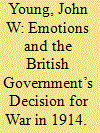

|
|
|
|
|
| Summary/Abstract |
Recent years have witnessed increasing interest amongst international historians in the impact of emotions on foreign policy decisions as part of a broader movement usually known as the ‘emotional turn’. This trend is associated with findings from the field of neuroscience that cognition and emotion—rather than operating independently—remain inextricably bound together in human decision-making. Most work thus far has concentrated on American foreign policy since 1945, but this analysis broadens the focus to consider the impact of emotions on British decision-makers, especially Cabinet ministers, as they debated whether to go to war in 1914. It shows that despite a tendency by the protagonists themselves to interpret their actions in rational terms, sufficient evidence of emotions exist in the written record to allow a fresh approach to the July Crisis. Whilst emotions must be seen as acting alongside rational mental processes, rather than regularly over-powering them, a focus on the subject helps explain different approaches taken by individual ministers, why the majority came to approve intervention in the conflict, and how Prime Minister Herbert Asquith, partly by appearing to control his feelings, minimised resignations over the fateful decision. It also allows a new view about why the Cabinet decided to go to war on 4 August in defence of Belgium, despite deciding just a few days earlier that the question of fulfilling the 1839 guarantee of Belgian neutrality was ‘one of policy than of legal obligation’.
|
|
|
|
|
|
|
|
|
|
|
|
|
|
|
|
| 8 |
ID:
092194
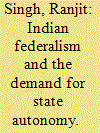

|
|
|
|
|
| Publication |
2009.
|
| Summary/Abstract |
The essence of federalism lies not in the constitutional or institutional structure but in society itself. A federal government is a device by which the federal qualities of a society are articulated and protected.
|
|
|
|
|
|
|
|
|
|
|
|
|
|
|
|
| 9 |
ID:
091746


|
|
|
|
|
| Publication |
2009.
|
| Summary/Abstract |
When internment was introduced in Northern Ireland on 9 August 1971, the Stormont and British Governments received immediate criticism for the move from within the United Kingdom and the Republic of Ireland. Condemnation widened as reports of ill-treatment at the hands of the security forces during arrest, whilst in custody and employed in conjunction with interrogation reached the public domain. After arrest prisoners were first questioned by the police to confirm the right person had been arrested and to establish whether they should be questioned with a view to preferring a criminal charge, whether they should be transferred to an interrogation centre for secondary interrogation with the aim of eliciting intelligence, or, if unsuitable for either of these, be released. In addition to secondary interrogation, 14 men were interrogated 'in-depth'.
|
|
|
|
|
|
|
|
|
|
|
|
|
|
|
|
| 10 |
ID:
092975
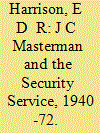

|
|
|
|
|
| Publication |
2009.
|
| Summary/Abstract |
The significance of J.C. Masterman's relationship with the Security Service, MI5, has not been fully appreciated. As a junior officer during World War II, he consistently sought to achieve good working relations with the Secret Intelligence Service. After the war he continued to take an interest in the Security Service and worked closely with other MI5 elder statesmen to ensure that the successor to Percy Sillitoe as Director-General came from within the Service. Masterman always hoped that his account of the double agents run by British Intelligence during World War II would one day be published. As the public image of the British secret services deteriorated during the 1960s, Masterman believed that MI5 did not grasp how his book could promote its interests, and so he insisted on forcing through publication anyway. The correspondence from serving and former MI5 officers in Masterman's papers vividly illustrate changing attitudes to official secrecy and the declining ability of the British Government to enforce it.
|
|
|
|
|
|
|
|
|
|
|
|
|
|
|
|
| 11 |
ID:
137948
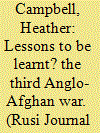

|
|
|
|
|
| Summary/Abstract |
At the end of the Third Anglo-Afghan War, the British government in the metropole and the British-led Indian government found themselves at odds in their interpretation of the political situation in Afghanistan, leading them to pursue different policies towards this difficult interlocutor. Heather Campbell analyses the primary sources documenting the difficulties of this decision-making process, and suggests that a sound knowledge of history may be a useful foundation for policy-makers seeking to shape the future of the UK's relationship with Afghanistan.
|
|
|
|
|
|
|
|
|
|
|
|
|
|
|
|
| 12 |
ID:
099061
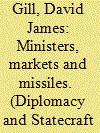

|
|
|
|
|
| Publication |
2010.
|
| Summary/Abstract |
Existing accounts of British efforts to achieve a nuclear non-proliferation treaty between 1964 and 1968 largely overlook the later stages of decision making within the Labour government. Scrutiny of previously classified sources reveals that a desire for entry into the European Economic Community had a much larger influence on the content and conduct of British non-proliferation policy than previously suggested. By 1967, Prime Minister Harold Wilson sought a secondary role in treaty negotiations, and left the running to the superpowers. This avoided unnecessary conflict with the countries of the Community, resentful of the Treaty's discriminatory terms, and helped to protect Britain's application to join the EEC. Although this bid was unsuccessful, ambitions for future membership continued to influence non-proliferation policy in 1968. Indeed, a desire for future entry into the EEC helps to explain why Britain became the first nuclear weapon state to ratify the Treaty.
|
|
|
|
|
|
|
|
|
|
|
|
|
|
|
|
| 13 |
ID:
092069
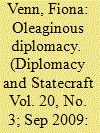

|
|
|
|
|
| Publication |
2009.
|
| Summary/Abstract |
There has been considerable controversy as to the significance of oil in the Lausanne Conference of 1922-1923, in particular British attempts to retain Mosul as part of Iraq. However, as this article explores, the conference also had important implications for the composition of the British-registered Turkish Petroleum Company, which was expected to win the Iraqi oil concession. In the first phase of the conference, the United States observer delegation's stance persuaded the British Government to put pressure upon the British companies involved in the TPC to admit American companies upon the latter's terms. Despite this, in the second phase, the Americans supported the Turkish delegation in its opposition to clauses in the proposed Treaty, which would have guaranteed the rights of the TPC, and forced a British compromise on the issue. The Lausanne Conference played a significant role in the Anglo-American "oil war" of the inter-war period.
|
|
|
|
|
|
|
|
|
|
|
|
|
|
|
|
| 14 |
ID:
084492
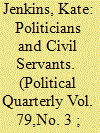

|
|
|
|
|
| Publication |
2008.
|
| Summary/Abstract |
This article discusses the origins of the Efficiency Unit's 'Next Steps' Report, published 20 years ago which recommended the executive agency as an organisation for much of the British government. Within five years more than half the civil service had been transferred to work in agencies but the other major recommendation of the report - improving the management skills of the senior civil service received far less enthusiastic attention. From the Fulton Report, the Next Steps report to the Capability Reviews of current Whitehall the same problem is highlighted: there is still too little management competence within the public service despite the endorsement of the need for improvement by successive governments
|
|
|
|
|
|
|
|
|
|
|
|
|
|
|
|
| 15 |
ID:
122222
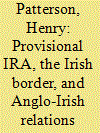

|
|
|
|
|
| Publication |
2013.
|
| Summary/Abstract |
Using hitherto largely unexplored governmental archives from London and Dublin, this article focuses on the security challenges arising from the existence of the land frontier between the Republic of Ireland and Northern Ireland and the significance of issues of cross-border security cooperation for Anglo-Irish relations from the beginning of the Troubles until the Anglo-Irish Agreement in 1985. It argues that the relatively safe haven of the Republic was essential to the longevity of the IRA's campaign and that successive Irish governments exploited British security concerns to expand their political influence on Northern Ireland.
|
|
|
|
|
|
|
|
|
|
|
|
|
|
|
|
| 16 |
ID:
122046
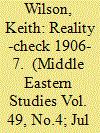

|
|
|
|
|
| Publication |
2013.
|
| Summary/Abstract |
The article deals with the British government's recognition of limitations of its power of defence against the Ottoman Empire. The material used comes mainly from the papers of the Committee of Imperial Defence.
|
|
|
|
|
|
|
|
|
|
|
|
|
|
|
|
| 17 |
ID:
141626
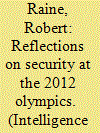

|
|
|
|
|
| Summary/Abstract |
Securing the 2012 Olympic Games was the biggest security operation in the UK for nearly 70 years. It demanded levels of resources unparalleled in peacetime and involved the British Government much more deeply in strategy, planning and assurance for a domestic security operation than is usual. The UK's counter-terrorist strategy, CONTEST, provided the basic framework for the approach to Olympic security but steps were needed to mitigate all risks to the Games security. It was an exceptional level of inter-agency coordination and cooperation, rather than any new techniques, that lay behind the success of the security posture.
|
|
|
|
|
|
|
|
|
|
|
|
|
|
|
|
| 18 |
ID:
100727
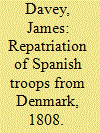

|
|
|
|
|
| Publication |
2010.
|
| Summary/Abstract |
Following the Spanish revolts of 1808 against French occupation of their country, Spanish regiments that had previously fought for Napoleon in northern Europe became anxious to return to their homeland to support the uprising. The British government, very much aware of the military and political utility of removing this force from Scandinavia, prepared and executed an operation to remove the soldiers from Denmark and carry them back to Spain. This article outlines how this remarkable operation was managed and conducted, studying the political, administrative, and logistical elements, before moving on to consider its wider implications, both for Britain and for the war in Spain.
|
|
|
|
|
|
|
|
|
|
|
|
|
|
|
|
| 19 |
ID:
103151
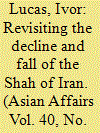

|
|
|
|
|
| Publication |
2009.
|
| Summary/Abstract |
A brief account of the events leading up to the fall of the Shah, followed by an examination of how those events were seen and evaluated by the British government, especially the Foreign Office department concerned, of which Ivor Lucas was the head. Against this background he also provides an assessment of how far the British Government had realistic alternative policy options.
|
|
|
|
|
|
|
|
|
|
|
|
|
|
|
|
| 20 |
ID:
107088
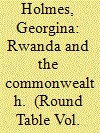

|
|
|
|
|
| Publication |
2011.
|
| Summary/Abstract |
As with most British media coverage in 1994, the BBC did not report genocide in Rwanda, preferring instead to depict political violence as tribal civil war and 'primitive' ethnic conflict. Yet when the international community declared that genocide had taken place, the BBC was quick to change its tack, moving away from reporting ethnic conflict towards memorialising genocide. Referring to the BBC's website, political discussion programmes and documentary films, the article considers how over time an institutional narrative on the 1994 genocide has developed. The author argues that the BBC has been required to reconcile the problem of depicting genocide-conventionally seen as modern, 'Western' political violence-in Africa. The ways in which the BBC has remembered Rwanda's genocide also conceal from view British foreign policy decision-making between April and July 1994. The author then considers how, since Rwanda joined the Commonwealth in November 2009, the BBC's reporting has shifted again-this time towards framing news in the context of democracy and freedom of speech.
|
|
|
|
|
|
|
|
|
|
|
|
|
|
|
|
|
|
|
|
|